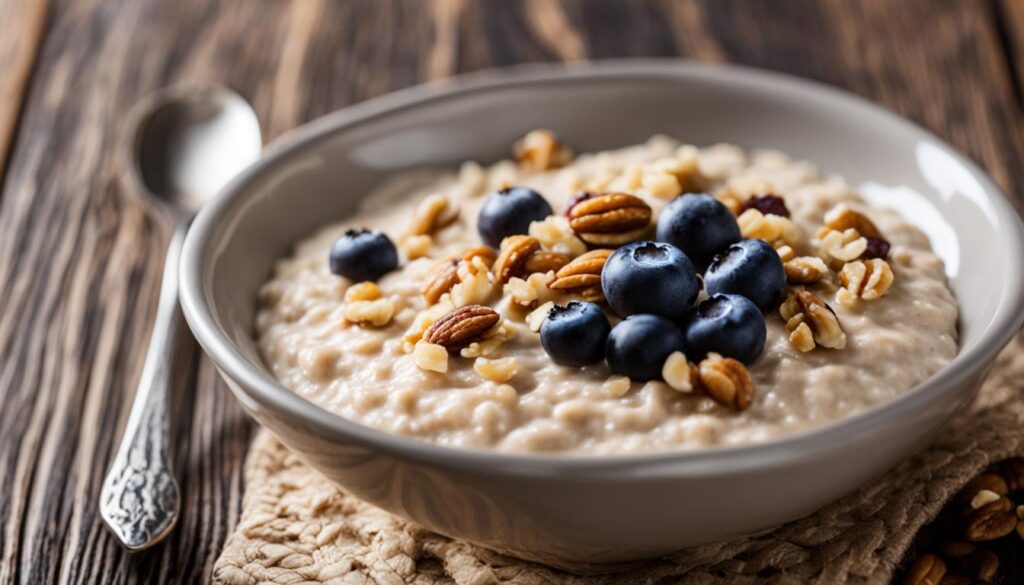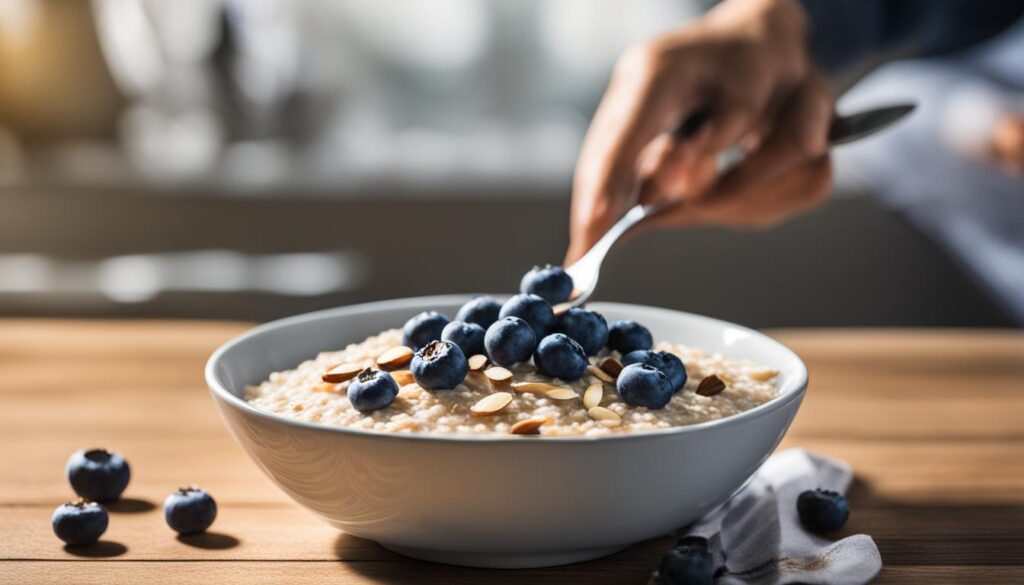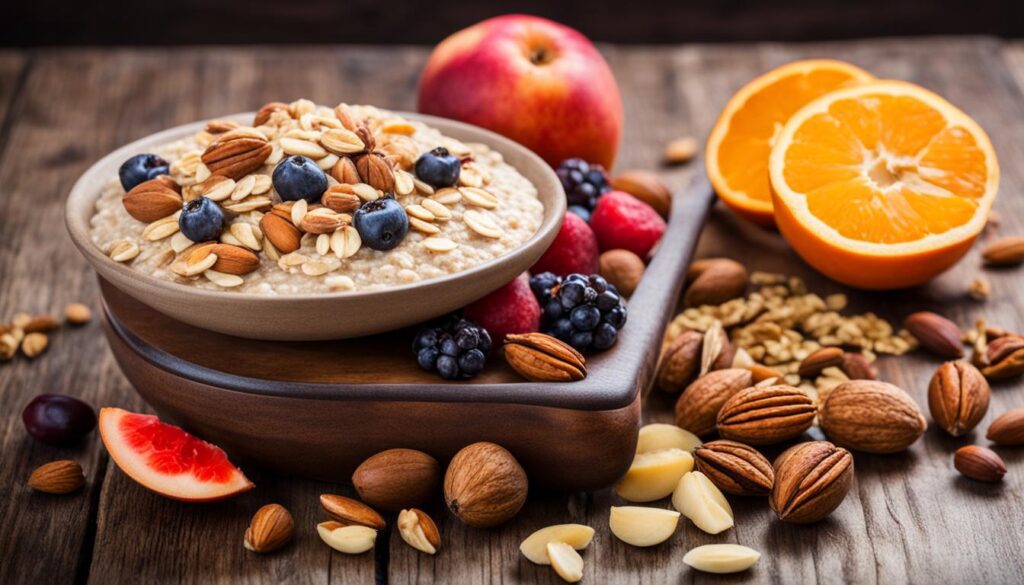Oatmeal, a beloved breakfast staple for many, offers numerous benefits for overall health and well-being. Packed with essential nutrients, fiber, and antioxidants, oatmeal has gained recognition for its potential positive effects on weight management, heart health, digestion, blood sugar control, skin health, and even mood improvement. In this article, I will explore the various oatmeal benefits that can help you optimize your daily health.
Key Takeaways:
- Oatmeal is a nutrient-dense food that provides essential vitamins and minerals.
- Adding fat and protein to oatmeal can help regulate blood sugar levels and increase satiety.
- Oatmeal is known for its potential to lower cholesterol levels and support heart health.
- The fiber content in oatmeal promotes healthy digestion and regular bowel movements.
- Consuming oatmeal can contribute to weight loss efforts by promoting feelings of fullness.
The Truth About Oatmeal’s Glycemic Index

Oatmeal is often considered a healthy breakfast option, but have you ever wondered about its impact on blood sugar levels? The glycemic index of oatmeal plays a crucial role in determining how quickly it raises blood sugar levels after consumption.
When oatmeal is processed, such as in the case of instant oatmeal, its glycemic index tends to be higher. This means that consuming instant oatmeal can lead to a rapid spike in blood sugar levels, which can be especially problematic for individuals who need to manage their blood sugar levels or are trying to switch into a fat-burning state.
To avoid these issues, opting for slow-cooked oatmeal or steel cut oats can be a better alternative. The slow-cooking process breaks down the starches in the oats, resulting in a slower release of glucose into the bloodstream. This gradual release helps to stabilize blood sugar levels, contributing to better blood sugar control and overall health.
By making the switch from instant oatmeal to slow-cooked oatmeal or steel cut oats, you can enjoy the nutritional benefits of oatmeal without compromising your blood sugar control. Let’s take a closer look at the comparison between instant oatmeal and slow-cooked oatmeal:
| Oatmeal Type | Glycemic Index |
|---|---|
| Instant Oatmeal | High |
| Slow-Cooked Oatmeal or Steel Cut Oats | Low |
As shown in the table, instant oatmeal has a high glycemic index, while slow-cooked oatmeal or steel cut oats have a low glycemic index. Choosing the latter options can help you maintain more stable blood sugar levels and promote better blood sugar control.
So, next time you reach for oatmeal, opt for the slow-cooked or steel cut variety to keep your blood sugar levels in check and support your overall health.
Optimizing Blood Sugar Levels with Oatmeal

When it comes to blood sugar control, oatmeal can be a valuable addition to your diet. However, to truly optimize blood sugar levels, it’s important to make the right choices and pair oatmeal with other nutrients.
One key strategy is to add fat and protein to your oatmeal. By doing so, you can slow down the digestion process, preventing rapid spikes in blood sugar levels. Incorporating healthy fats such as nuts or seeds, as well as a source of protein like Greek yogurt or almond butter, can help regulate blood sugar levels and provide a more balanced meal.
“Adding fats and proteins to oatmeal can help regulate blood sugar levels, preventing spikes and supporting overall blood sugar control.”
This combination of macronutrients not only aids in blood sugar control but also increases satiety, helping you feel fuller for longer. This can prevent overeating and support weight management goals.
Including fat and protein in your oatmeal also has the added benefit of improving the nutrient profile of your meal. Healthy fats provide essential nutrients and promote satiety, while protein supports muscle repair and growth.
To further optimize blood sugar levels, choosing the right type of oatmeal is crucial. Slow-cooked oatmeal, such as steel-cut oats or rolled oats, has a lower glycemic index compared to instant oatmeal. This means it releases glucose into the bloodstream more gradually, preventing sudden spikes in blood sugar levels.
By carefully considering the composition of your oatmeal and making mindful choices, you can ensure that this nutritious breakfast option supports your blood sugar control goals.
| Nutrient | Role | Sources |
|---|---|---|
| Healthy Fats | Regulate blood sugar levels, provide essential nutrients | Nuts, seeds |
| Protein | Regulate blood sugar levels, increase satiety, support muscle repair and growth | Greek yogurt, almond butter |
| Slow-Cooked Oats | Lower glycemic index, gradual release of glucose | Steel-cut oats, rolled oats |
The Impact of Oatmeal on Heart Health

Oatmeal has been recognized for its positive impact on heart health. Regular consumption of oatmeal has been shown to lower cholesterol levels and reduce the risk of cardiovascular diseases.
The soluble fiber found in oats, specifically beta-glucan, plays a crucial role in promoting heart health. Beta-glucan helps reduce the absorption of LDL (bad) cholesterol in the body, preventing it from clogging arteries and reducing the risk of heart-related conditions.
By incorporating oatmeal into your diet, you can actively engage in cardiovascular disease prevention. The consumption of oats can help regulate blood pressure levels, contributing to a healthier cardiovascular system overall.
Lowering Cholesterol with Oatmeal
The soluble fiber in oatmeal forms a gel-like substance in the digestive system. This substance binds to cholesterol, preventing its absorption and aiding in its removal from the body. This process helps lower LDL cholesterol levels and promotes healthy cholesterol management.
Benefits of Oatmeal for Heart Health
| Benefits | Explanation |
|---|---|
| Lower Cholesterol | Oatmeal’s soluble fiber, beta-glucan, helps reduce the absorption of LDL cholesterol, promoting healthier cholesterol levels. |
| Cardiovascular Disease Prevention | By lowering cholesterol and regulating blood pressure, oatmeal can reduce the risk of cardiovascular diseases such as heart attacks and strokes. |
Including oatmeal as part of a balanced, heart-healthy diet can significantly contribute to maintaining a healthy heart and reducing the risk of heart-related conditions.
“Oats contain a type of fiber called beta-glucan, which can help lower cholesterol levels and reduce the risk of heart disease.”
Oatmeal’s Benefits for Digestion

Oats are a fantastic source of dietary fiber, which plays a crucial role in promoting healthy digestion. The fiber content in oatmeal helps prevent constipation and supports regular bowel movements, ensuring the smooth functioning of your digestive system. By including oatmeal in your diet, you can enjoy the following benefits for digestion:
- Promotes Regular Bowel Movements: The fiber in oatmeal adds bulk to your stool, aiding in its passage through the digestive tract and preventing constipation.
- Provides Relief from Digestive Issues: Oatmeal’s fiber content can help alleviate symptoms of digestive issues, such as bloating and gas, by promoting better digestion.
- Supports a Healthy Gut: The fiber in oatmeal acts as a prebiotic, nourishing the beneficial bacteria in your gut and promoting a healthy gut microbiome.
Including oatmeal in your diet can help regulate digestion, improve gut health, and provide relief from digestive discomfort. Enjoy a warm bowl of oatmeal in the morning or try incorporating oats into recipes like oatmeal cookies or granola for a delicious and digestive-friendly treat!
Oatmeal’s high fiber content promotes regular bowel movements, prevents constipation, and supports a healthy digestive system. Including oatmeal in your diet can help regulate digestion, improve gut health, and provide relief from digestive issues.
Lowering Cholesterol with Oatmeal

Oatmeal, rich in beta-glucan, has been shown to lower levels of LDL (bad) cholesterol, reducing the risk of heart disease. The soluble fiber in oatmeal forms a gel-like substance in the digestive system, which binds to cholesterol and removes it from the body. Including oatmeal in your diet can contribute to maintaining healthy cholesterol levels.
| Benefits of Oatmeal for Lowering Cholesterol | How it Works |
|---|---|
| Rich in beta-glucan | Beta-glucan, a type of soluble fiber found in oatmeal, helps reduce the absorption of LDL cholesterol in the body. |
| Forms a gel-like substance | The soluble fiber in oatmeal forms a gel-like substance in the digestive system, which binds to cholesterol and removes it from the body. |
| Reduces the risk of heart disease | By lowering LDL cholesterol levels, oatmeal can help reduce the risk of heart disease and improve heart health. |
Including oatmeal in your regular diet can be a simple and delicious way to support your heart health and maintain healthy cholesterol levels. Enjoy a bowl of warm oatmeal topped with your favorite fruits and nuts, or explore creative oatmeal recipes to add variety to your meals.
Oatmeal for Blood Sugar Control

Oatmeal offers a multitude of health benefits, including its positive impact on blood sugar levels. With its relatively low glycemic index, oatmeal is an excellent choice for individuals looking to manage their blood sugar and maintain stable levels throughout the day.
The glycemic index is a measure of how quickly a food raises blood sugar levels. Foods with a low glycemic index release glucose into the bloodstream gradually, preventing spikes and crashes in blood sugar. Oatmeal falls into this category, making it suitable for individuals with diabetes or those aiming to regulate their blood sugar.
By incorporating oatmeal into your diet, you can optimize your blood sugar levels and promote a more balanced state of well-being. This steady release of glucose can provide sustained energy and help prevent sudden cravings or hunger pangs.
To further enhance blood sugar control, consider adding protein and healthy fats to your oatmeal. Protein and fats slow down digestion, preventing rapid rises in blood sugar. Accompanying your oatmeal with ingredients like nuts, seeds, Greek yogurt, or almond butter can create a more balanced and satisfying meal.
Oatmeal is a versatile ingredient that can be enjoyed in various forms, including classic oatmeal, overnight oats, or oatmeal smoothies. Experiment with different combinations to suit your taste preferences and dietary needs.
The Benefits of Oatmeal for Blood Sugar Control:
- Stabilizes blood sugar levels
- Sustained release of glucose into the bloodstream
- Helps manage blood sugar in individuals with diabetes
- Enhances overall well-being and energy levels
- Decreases the likelihood of sudden cravings or hunger
Oatmeal’s Benefits for Skin Health
Oatmeal offers a multitude of benefits for maintaining healthy, radiant skin. Its rich composition includes powerful antioxidants and anti-inflammatory properties that work wonders for skin health.
Oatmeal contains antioxidants, specifically avenanthramides, which play a crucial role in protecting skin cells from oxidative damage caused by environmental factors such as pollution and UV radiation. These antioxidants help combat free radicals, preventing premature aging and maintaining a youthful appearance.
Furthermore, oatmeal’s anti-inflammatory properties make it a valuable ingredient for soothing irritated or inflamed skin. Its gentle and calming effects can help alleviate various skin conditions, including dryness, redness, and itchiness.
To fully harness the skin-enhancing benefits of oatmeal, you can incorporate oatmeal-based skincare products into your routine or even apply oatmeal topically. Oatmeal baths, face masks, and creams are popular choices for reaping its natural goodness.
Did you know? Oatmeal has been used for centuries in skincare remedies due to its exceptional calming and healing properties.
Whether you’re dealing with sensitive skin, acne, or simply wishing to maintain a healthy complexion, incorporating oatmeal into your skincare regimen can work wonders for your skin’s overall health and appearance.
Oatmeal Skincare Recipe Ideas
To help you get started, here are a few simple and rejuvenating oatmeal skincare recipes:
- Oatmeal Honey Face Mask:
- Ingredients:
- 2 tablespoons of oatmeal
- 1 tablespoon of honey
- Mix the oatmeal and honey together until you have a smooth paste. Apply the mixture to your face, leave it on for 15 minutes, and rinse off with warm water. Enjoy the nourishing and moisturizing effects!
- Ingredients:
- Oatmeal Bath Soak:
- Ingredients:
- 1 cup of finely ground oatmeal
- 2 tablespoons of milk powder
- A few drops of essential oil (such as lavender or chamomile)
- Add the oatmeal, milk powder, and essential oil to a warm bath. Soak in the soothing blend for approximately 20 minutes, allowing the oatmeal to nourish and calm your skin.
- Ingredients:
- Oatmeal Body Scrub:
- Ingredients:
- 1/2 cup of oatmeal
- 2 tablespoons of coconut oil
- 1 tablespoon of brown sugar
- A few drops of your favorite essential oil (optional)
- Mix all the ingredients together to create a gentle exfoliating scrub. Gently massage the scrub onto your body in circular motions, then rinse off with warm water. Feel the smoothness of your skin as the oatmeal works its magic!
- Ingredients:
Remember to perform a patch test before applying any DIY oatmeal skincare recipes to ensure compatibility with your skin type and to avoid any potential allergies or sensitivities.
Oatmeal for Weight Loss

When it comes to weight loss, oatmeal is a valuable ally. Its high fiber content and ability to promote satiety make it a popular choice among those looking to manage their weight effectively.
The fiber in oatmeal plays a crucial role in weight loss. It helps you feel fuller for longer periods, reducing the likelihood of overeating or snacking between meals. By including oatmeal in your weight loss plan, you can curb hunger pangs and maintain a balanced diet.
Oatmeal’s ability to promote satiety can be attributed to its complex carbohydrate content. Unlike simple carbohydrates that quickly raise blood sugar levels and lead to hunger crashes, the complex carbohydrates in oatmeal are digested more slowly, providing sustained energy and a lasting feeling of fullness.
To harness the weight loss benefits of oatmeal, it’s important to choose the right type. Steel-cut oats and old-fashioned rolled oats are better options than instant oatmeal, which often contains added sugars and has a higher glycemic index.
| Oatmeal Type | Glycemic Index |
|---|---|
| Steel-Cut Oats | 42 |
| Old-Fashioned Rolled Oats | 55 |
| Instant Oatmeal | 66 |
As shown in the table, steel-cut oats have the lowest glycemic index, followed by old-fashioned rolled oats. These options are digested more slowly, resulting in a gradual release of glucose into the bloodstream and better blood sugar control.
When incorporating oatmeal into your weight loss plan, you can boost its taste and nutritional value by adding various toppings. Consider adding fruits like berries or banana slices for added antioxidants and natural sweetness. Additionally, a sprinkle of nuts or seeds can provide healthy fats and additional fiber.
Key Points:
- Oatmeal’s high fiber content promotes satiety and aids weight loss efforts.
- Steel-cut oats and old-fashioned rolled oats are better choices than instant oatmeal for weight management.
- The complex carbohydrates in oatmeal help regulate blood sugar levels and provide sustained energy.
- Enhance the flavor and nutritional value of oatmeal by adding fruits, nuts, or seeds.
Including oatmeal in your weight loss journey can support your overall efforts to manage weight and maintain a balanced diet. Its ability to promote satiety and provide essential nutrients makes it a smart choice for those seeking effective and sustainable weight loss.
Oatmeal’s Impact on Serotonin Production
Oatmeal contains an amino acid called tryptophan, which is a precursor to serotonin, a neurotransmitter that regulates mood and promotes feelings of well-being.
Consuming oatmeal can boost serotonin levels and potentially improve mood. The tryptophan in oatmeal contributes to the production of serotonin, which plays a key role in mood improvement and mental well-being.
Eating oatmeal after turkey, which also contains tryptophan, can enhance the conversion of tryptophan into serotonin, creating a serotonin experience that makes you feel good.
“Oatmeal’s tryptophan content can increase serotonin levels, potentially leading to improved mood and overall well-being.”
By including oatmeal in your diet, you can provide your body with the necessary building blocks for serotonin production, helping to support a positive mood and emotional balance.
Benefits of Serotonin: Mood Improvement and Beyond
Serotonin is often referred to as the “happy hormone” as it plays a crucial role in mood regulation, but its benefits extend beyond improving mood. Adequate levels of serotonin can also contribute to:
- Reduced anxiety
- Better sleep quality
- Enhanced cognitive function
- Increased resilience to stress
Consuming oatmeal and other tryptophan-rich foods can help support serotonin production and unlock these benefits for better overall well-being.
Adding oatmeal to your meal plan is a delicious and nutritious way to naturally boost serotonin levels and promote a positive mood and emotional balance.
Incorporating Oatmeal into a Healthy Diet
Oatmeal is a versatile ingredient that can be easily incorporated into a healthy diet, offering a wide range of delicious and nutritious options. Whether you prefer the classic oatmeal, overnight oats, oat smoothies, oat pancakes, oat bran muffins, or homemade granola, there are numerous ways to enjoy the benefits of oatmeal and add variety to your meals.
One popular choice is classic oatmeal, which can be customized with toppings like fresh berries, nuts, seeds, or a drizzle of honey for added flavor and nutrition. Overnight oats are another convenient option, allowing you to prepare your breakfast the night before for a quick and easy meal in the morning. Simply combine oats, milk or yogurt, and your choice of sweeteners or fruits in a jar, refrigerate overnight, and enjoy a creamy, no-cook oatmeal breakfast.
Oat smoothies are a great way to pack in the nutrients and enjoy a refreshing meal on the go. Blend oats with your favorite fruits, yogurt, milk, and a handful of spinach or kale for an added nutrient boost. For those who love indulgent breakfasts, oat pancakes made with blended oats, eggs, milk, and a touch of baking powder can be a delicious treat.
If you’re looking for a high-fiber snack or a tasty addition to your breakfast routine, oat bran muffins or homemade granola are excellent choices. Oat bran muffins are easy to make and can be enjoyed as a grab-and-go snack. Homemade granola allows you to control the ingredients and create a nutritious blend of oats, nuts, seeds, and dried fruits.
By incorporating oatmeal into your diet in these various forms, you can enjoy its versatility and reap its numerous health benefits. Whether you’re looking to increase fiber intake, improve heart health, support digestion, or manage weight, oatmeal is a delicious addition to your daily meals.
FAQ
What are the health benefits of oatmeal?
Oatmeal offers numerous health benefits, including promoting weight loss, supporting heart health, aiding digestion, lowering cholesterol levels, stabilizing blood sugar, and improving skin health.
Does oatmeal have a high glycemic index?
Instant oatmeal does have a high glycemic index, but slow-cooked oatmeal or steel-cut oats have a lower glycemic index, making them a better choice for blood sugar control.
How can I optimize blood sugar levels when consuming oatmeal?
To optimize blood sugar levels, it’s recommended to add fat and protein to oatmeal. This can be done by including nuts or seeds and a source of protein, such as Greek yogurt or almond butter, in your oatmeal.
How does oatmeal benefit heart health?
Oatmeal can lower cholesterol levels due to its soluble fiber content. The beta-glucan in oatmeal helps reduce the absorption of LDL (bad) cholesterol, thereby lowering the risk of cardiovascular diseases.
Is oatmeal good for digestion?
Yes, oatmeal is beneficial for digestion. Its fiber content promotes regular bowel movements and helps maintain a healthy digestive system. It can provide relief from constipation and contribute to overall gut health.
Can oatmeal help lower cholesterol?
Yes, oatmeal contains beta-glucan, a soluble fiber that helps lower LDL (bad) cholesterol levels. Including oatmeal in your diet can contribute to maintaining healthy cholesterol levels and reducing the risk of heart disease.
Does oatmeal help control blood sugar?
Oatmeal has a low glycemic index, meaning it releases glucose into the bloodstream gradually. This can help stabilize blood sugar levels and is beneficial for individuals with diabetes or those aiming to regulate blood sugar.
What are the benefits of oatmeal for skin health?
Oatmeal possesses antioxidants and anti-inflammatory properties that can help protect skin cells from damage and soothe irritated or inflamed skin. Using oatmeal-based skincare products or applying oatmeal topically can improve skin health.
Can oatmeal aid in weight loss?
Oatmeal is often recommended for weight loss due to its high fiber content, which promotes satiety and reduces overeating. Including oatmeal in a balanced diet can support weight management efforts.
Does oatmeal impact serotonin production?
Oatmeal contains tryptophan, an amino acid that is a precursor to serotonin. Consuming oatmeal can boost serotonin levels, potentially improving mood and overall well-being.
How can I incorporate oatmeal into a healthy diet?
Oatmeal can be enjoyed in various ways, such as classic oatmeal, overnight oats, oat smoothies, oat pancakes, oat bran muffins, and homemade granola. Including oatmeal in your diet adds variety and reaps its numerous health benefits.
Source Links
- https://eightify.app/summary/fitness-and-nutrition/optimize-your-oatmeal-unveiling-the-surprising-truth-dr-mindy-pelz
- https://be-still-farms.com/blogs/healthy-organic-living-blog/unveiling-the-nutritional-treasure-the-benefits-of-rolled-oats
- https://www.businessinsider.in/science/health/food/article/power-of-oats-a-hearty-start-to-a-healthy-morning/articleshow/105131304.cms






